八下 Unit 9 Have you ever been to a museum? 单元复习知识点课件(34张PPT)
文档属性
| 名称 | 八下 Unit 9 Have you ever been to a museum? 单元复习知识点课件(34张PPT) | 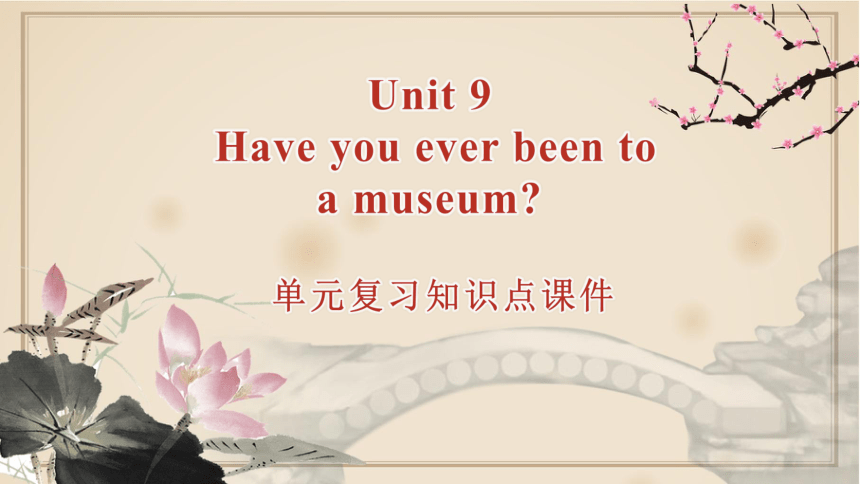 | |
| 格式 | pptx | ||
| 文件大小 | 278.3KB | ||
| 资源类型 | 教案 | ||
| 版本资源 | 人教新目标(Go for it)版 | ||
| 科目 | 英语 | ||
| 更新时间 | 2023-06-11 17:23:11 | ||
图片预览

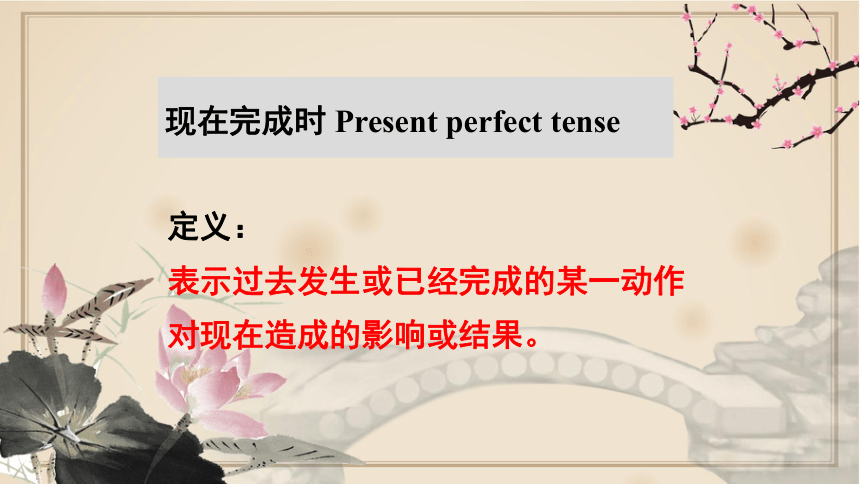
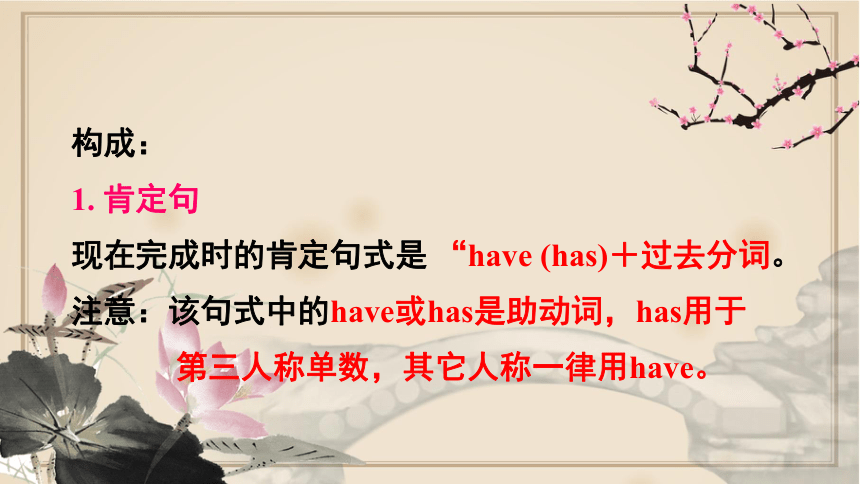
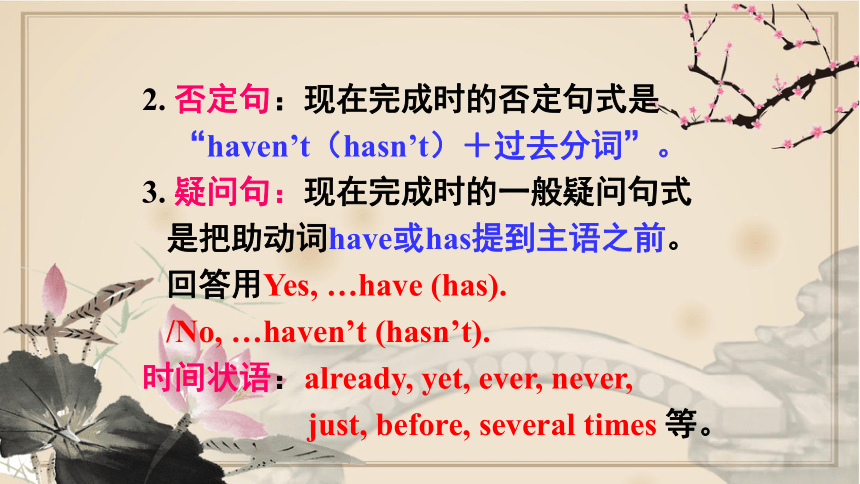
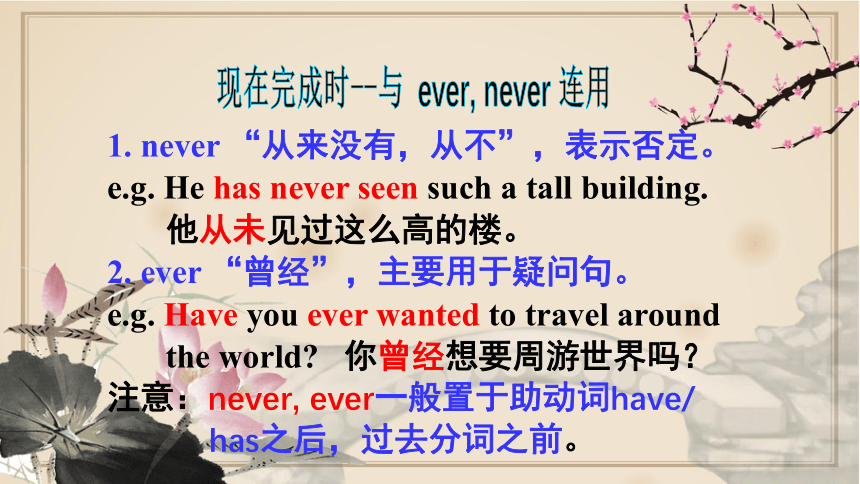
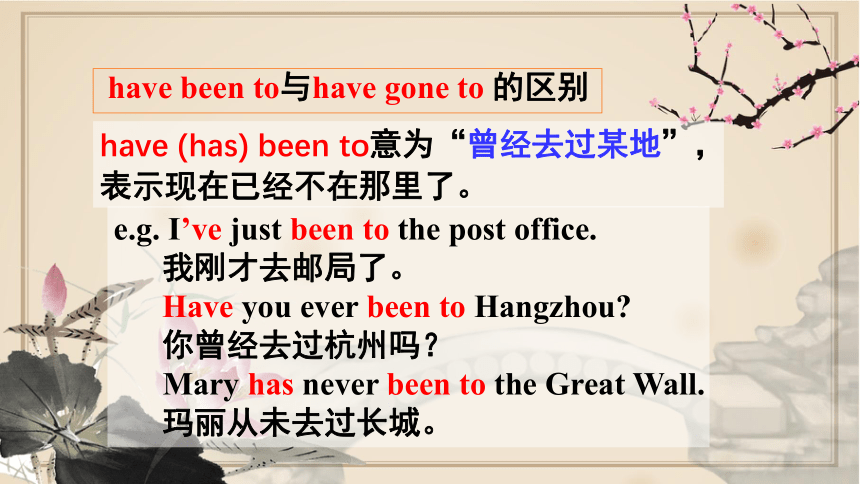
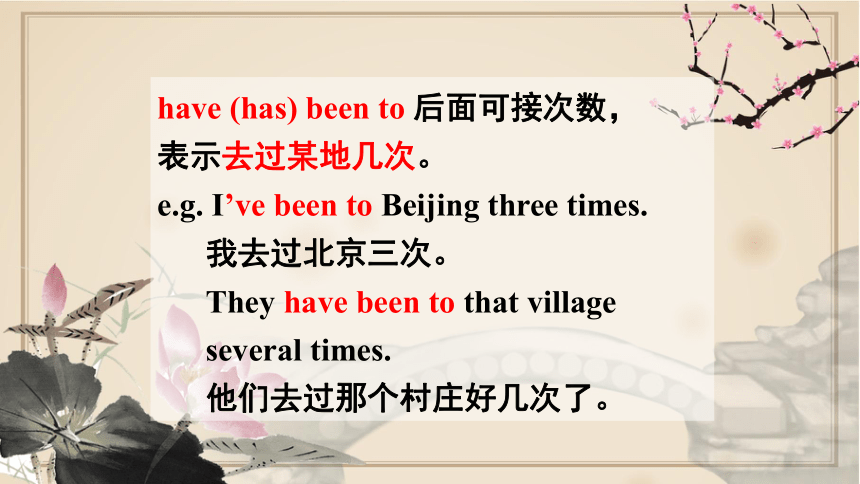
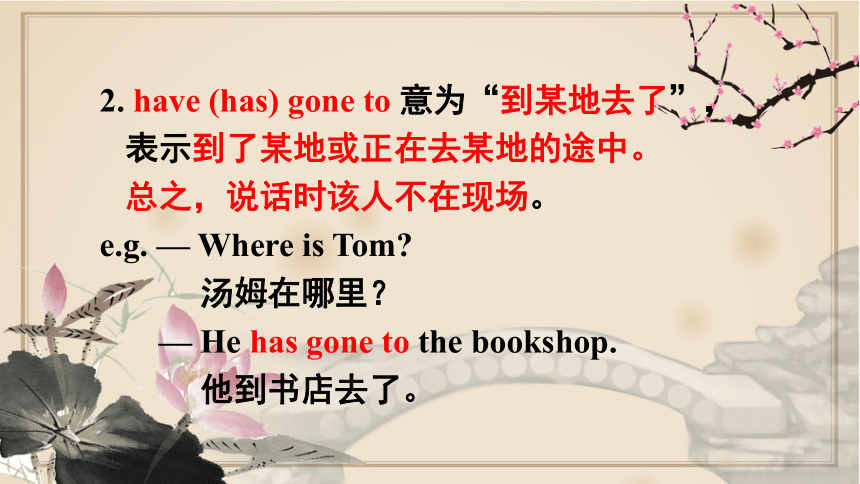
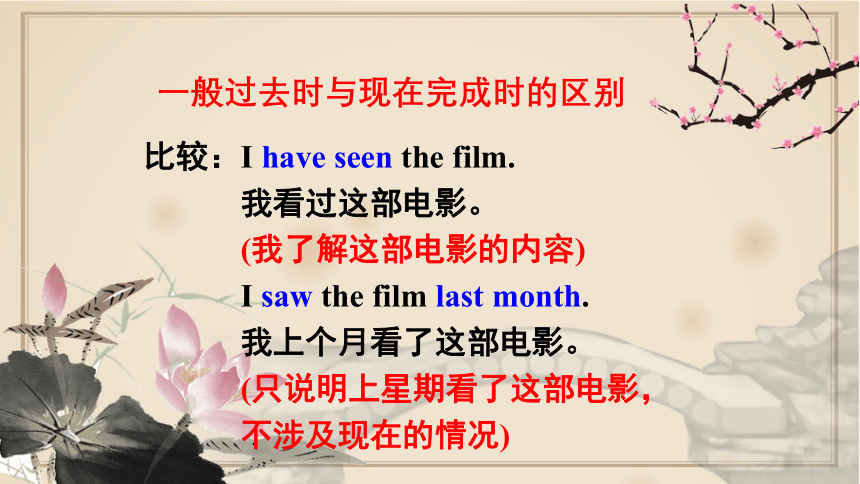
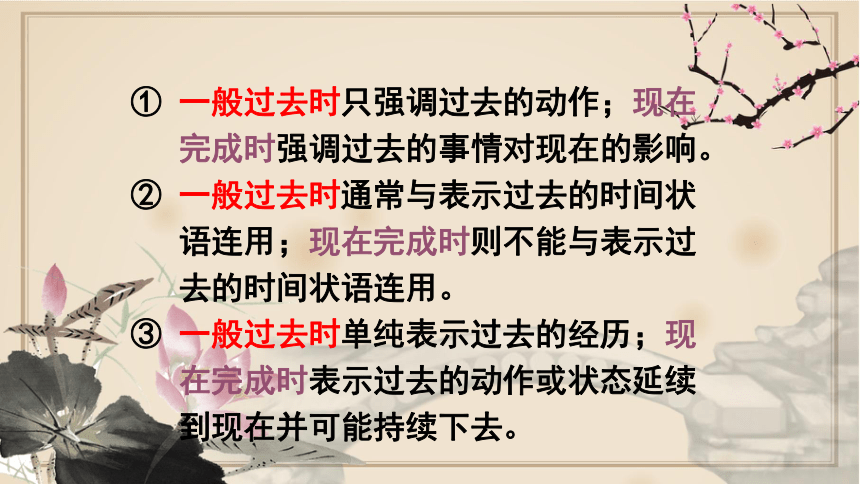
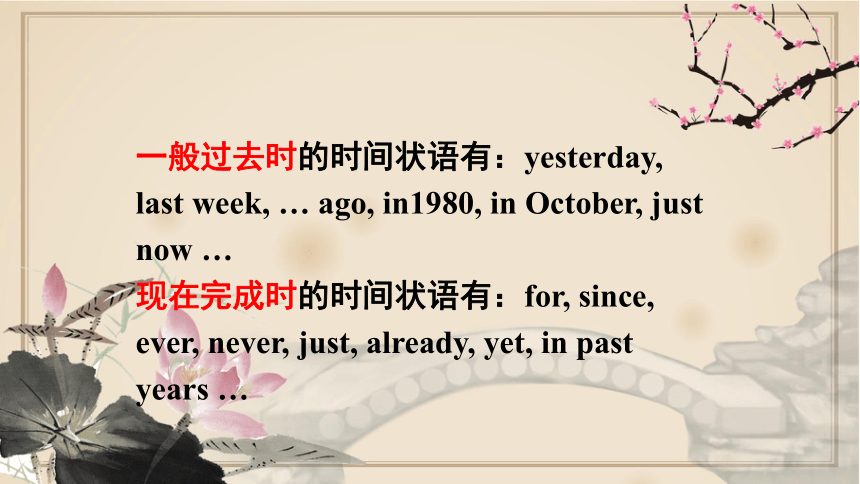
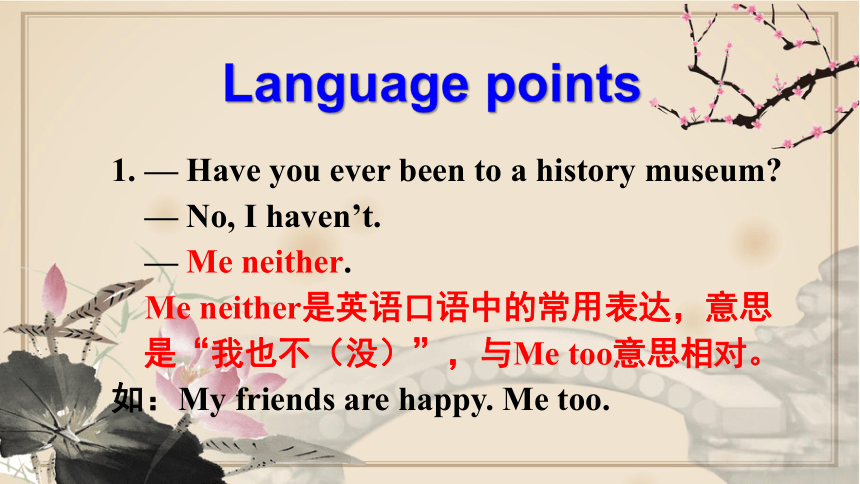
文档简介
(共34张PPT)
Unit 9
Have you ever been to a museum
单元复习知识点课件
现在完成时 Present perfect tense
定义:
表示过去发生或已经完成的某一动作
对现在造成的影响或结果。
构成:
1. 肯定句
现在完成时的肯定句式是 “have (has)+过去分词。
注意:该句式中的have或has是助动词,has用于
第三人称单数,其它人称一律用have。
2. 否定句:现在完成时的否定句式是
“haven’t(hasn’t)+过去分词”。
3. 疑问句:现在完成时的一般疑问句式
是把助动词have或has提到主语之前。
回答用Yes, …have (has). /No, …haven’t (hasn’t).
时间状语:already, yet, ever, never,
just, before, several times 等。
1. never “从来没有,从不”,表示否定。
e.g. He has never seen such a tall building.
他从未见过这么高的楼。
2. ever “曾经”,主要用于疑问句。
e.g. Have you ever wanted to travel around
the world 你曾经想要周游世界吗?
注意:never, ever一般置于助动词have/
has之后,过去分词之前。
现在完成时--与 ever, never 连用
have been to与have gone to 的区别
have (has) been to意为“曾经去过某地”,
表示现在已经不在那里了。
e.g. I’ve just been to the post office.
我刚才去邮局了。
Have you ever been to Hangzhou
你曾经去过杭州吗?
Mary has never been to the Great Wall.
玛丽从未去过长城。
have (has) been to 后面可接次数,
表示去过某地几次。
e.g. I’ve been to Beijing three times.
我去过北京三次。
They have been to that village
several times.
他们去过那个村庄好几次了。
2. have (has) gone to 意为“到某地去了”,
表示到了某地或正在去某地的途中。
总之,说话时该人不在现场。
e.g. — Where is Tom
汤姆在哪里?
— He has gone to the bookshop.
他到书店去了。
比较:I have seen the film.
我看过这部电影。
(我了解这部电影的内容)
I saw the film last month.
我上个月看了这部电影。
(只说明上星期看了这部电影,
不涉及现在的情况)
一般过去时与现在完成时的区别
① 一般过去时只强调过去的动作;现在
完成时强调过去的事情对现在的影响。
② 一般过去时通常与表示过去的时间状
语连用;现在完成时则不能与表示过
去的时间状语连用。
③ 一般过去时单纯表示过去的经历;现
在完成时表示过去的动作或状态延续
到现在并可能持续下去。
一般过去时的时间状语有:yesterday, last week, … ago, in1980, in October, just now …
现在完成时的时间状语有:for, since, ever, never, just, already, yet, in past years …
1. — Have you ever been to a history museum
— No, I haven’t.
— Me neither.
Me neither是英语口语中的常用表达,意思是“我也不(没)”,与Me too意思相对。
如:My friends are happy. Me too.
Language points
(1) 英语中表示后者与前者情形相同“也不……”时,常用neither引起的倒装句。其结构为:Neither+助动词/系动词be/情态动词+主语
e.g. I’m not tall. Neither is she.
= I’m not tall. She’s not tall, either.
我个子不高,她个子也不高。
(2) 如果表示后者与前者情形相同,“也……”常用so引起的倒装句。其结构为:
so+助动词/系动词be/情态动词+主语
e.g. My friends are happy. So am I.
= My friends are happy. I’m happy, too./ I’m also happy.
我的朋友高兴, 我也很高兴。
both 意为“两者都”,一般用于肯定的陈述句。与of连用作主语时,其后谓语动词用复数形式;作定语时,其后常跟名词的复数形式。
both / neither / either用法辨析
neither 意为“两者都不或两者中任何一个也不”,
表示“全否定”,与of 连用作主语时,其
后谓语动词用单数形式;作定语时,只修
饰可数名词的单数形式。
either 意为“两者中的任何一个”,用作主语时,
其后谓语动词用单数形式;用作定语时,
只修饰可数名词的单数形式。
2. I learned about the inventions that led to color movies, too.
我还了解了一些发明,它们成就了彩色电影。此处learn是“了解;获知;得知”的意思,由介词about或of引入所获知的具体内容。
e.g. The children were all shocked to learn of
the death of their headmaster.
得知校长去世,孩子们都十分震惊。
3. I’ve never been camping. 我从未野营过。
此句为现在完成进行时,这一时态的结构 has/have been + 现在分词,表示从过去某一时刻一直延续至今的动作。在本句中,说话人使用这一时态来强调自己至今从未有过野营的经历,欠缺这方面的经验。
e.g. We’ve been living like this ever since the birthof
my little brother.
自打我小弟弟出生,我们就一直这样生活。
4. The most interesting museum I’ve been to is the American Computer Museum.
多音节词和部分双音节形容词最高级加most构成,前面加the。如: the most beautiful girl
5. The old computers were much bigger.
much可修饰形容词比较级,表示“ ……得多”。
如: much richer
a little, even, a bit也可以修饰形容词比较级。
6. It’s unbelievable that technology has
progressed in such a rapid way.
句中rapid意为“快速的;飞快的”,表达
“发生或做得极快,用时短暂”,与fast,
quick同为近义词,但更加正式。
安全气囊急速膨起的力量可挽救成人的生命。
The force of the rapid inflation of airbags
saves adult lives.
这种疾病的迅猛传播给社会大众带来了恐慌。
The rapid spread of the disease has threatened
the public.
经常与rapid搭配使用的名词包括:change,
growth, increase, rise, decline, progress,
development, improvement等。
注意: 在rapid一词的使用中,最常见的是用
于描述事物及环境变化的短时和快速。
7. I wonder how much more computers will be able to do in the future.
不知道将来电脑还能够做些什么事情呢。
1)wonder 表示“ (对某事)感到疑惑;想要知道;想弄明白;琢磨”,后面常接由what, how, who 或者if/whether引导的宾语从句。
e.g. I wonder how they’re getting on.
我想知道他们现在过得怎样。
I just wonder if they’ve arrived safely.
我就想知道他们是否安全抵达了。
2) 此句从句部分的原始结构是: How much more will computers be able to do in the future 是对陈述句Computers will be able to do (much) more in the future.(电脑将来能够做更多的事情。)的提问。由于充当了宾语从句,疑问结构改成了陈述结构。
how much more computers will be able to do in the future, 即: 将助动词还原到陈述句的位置。
e.g. I don’t know when he will come.
我不知道他什么时候来。
I don’t know where he lives.
我不知道他住在哪里。
8. It also encourages governments and social groups to think about ways to…
encourage sb. to do sth. 鼓励某人做某事
e.g. My father encouraged me to take part in
the sports meeting.
父亲鼓励我参加运动会。
9. The tea art performances show how to make a perfect cup of tea with beautiful tea sets.
a perfect cup of tea意为“一杯好茶;一杯完美的茶水”。在英语中,当表示“量”的结构遇有描述性修饰,大多数情况下,人们习惯于将形容词置于表量名词(unit word)之前。
例如:
an easy piece of homework
a good cup of coffee
7. Watching the tea preparation is just as enjoyable as drinking the tea itself.
看沏茶的过程和饮茶本身一样令人愉快。
-able是一个典型的形容词后缀,可加在动词之后,
表示“可……的;能够……的”。此处enjoyable
(能使人快乐的;令人愉快的) 便是一例,如:
drinkable (可饮用的), washable(可洗的), readable
(可读的), usable(可用的; 可使用的)等等。
10. on the one hand… on the other hand
一方面……另一方面……
e.g.On the one hand, she taught English.
on the other hand, she learned
Chinese.
她一方面教英语,一方面学习汉语。
11. …more than three quarters of the population are Chinese…
quarter n. 四分之一;一刻钟
three quarters 四分之三
e.g. I’ve got to go in a quarter of an hour.
一刻钟以后我就得走了。
12. …Singapore is an English-speaking country,
so …新加坡是一个说英语的国家
English-speaking的意思是“说英语的;英语为
母语的;使用英语的”,是由English 和speaking
两个词组构成,这是英语中一种常见的形容词构
词形式,即:由名词和动词的-ing形式组合而成。
如:食草动物
一次采摘苹果之旅
grass-eating animals
an apple-picking trip
13. May be you fear that you won’t…
fear v. 害怕;担心
e.g. Many people fear change because
they do not like the old ways to be
changed.
很多人惧怕变化,因为他们不喜
欢旧有的生活方式被改变。
14. A lot of animals only wake up at
night…
wake v. 醒来;唤醒 (woke;woken)
e.g. She went upstairs to wake John.
她上楼去叫醒约翰。
15. It might seem strange to go to…
a) “好像,似乎” , 其后加形容词。
e.g. He seems unhappy today. 他今天好像不高兴。
She seems very sad. 她似乎很伤心。
b) seem + (to be) + n.
e.g. They seem (to be) doctors. 他们好像是医生。
c) seem + (to be) + 介词
e.g. It seems like years since I last saw her.
自从上次遇到她, 好像已过了许多年。
d) seem to do.
e.g. He seems to be happy. 他好像很高兴。
My mother seemed to know that.
我妈妈好像知道那件事。
e) It seems that + 从句
e.g. It seems that he is happy.
= He seems (to be) happy. 他好像很快乐。
Unit 9
Have you ever been to a museum
单元复习知识点课件
现在完成时 Present perfect tense
定义:
表示过去发生或已经完成的某一动作
对现在造成的影响或结果。
构成:
1. 肯定句
现在完成时的肯定句式是 “have (has)+过去分词。
注意:该句式中的have或has是助动词,has用于
第三人称单数,其它人称一律用have。
2. 否定句:现在完成时的否定句式是
“haven’t(hasn’t)+过去分词”。
3. 疑问句:现在完成时的一般疑问句式
是把助动词have或has提到主语之前。
回答用Yes, …have (has). /No, …haven’t (hasn’t).
时间状语:already, yet, ever, never,
just, before, several times 等。
1. never “从来没有,从不”,表示否定。
e.g. He has never seen such a tall building.
他从未见过这么高的楼。
2. ever “曾经”,主要用于疑问句。
e.g. Have you ever wanted to travel around
the world 你曾经想要周游世界吗?
注意:never, ever一般置于助动词have/
has之后,过去分词之前。
现在完成时--与 ever, never 连用
have been to与have gone to 的区别
have (has) been to意为“曾经去过某地”,
表示现在已经不在那里了。
e.g. I’ve just been to the post office.
我刚才去邮局了。
Have you ever been to Hangzhou
你曾经去过杭州吗?
Mary has never been to the Great Wall.
玛丽从未去过长城。
have (has) been to 后面可接次数,
表示去过某地几次。
e.g. I’ve been to Beijing three times.
我去过北京三次。
They have been to that village
several times.
他们去过那个村庄好几次了。
2. have (has) gone to 意为“到某地去了”,
表示到了某地或正在去某地的途中。
总之,说话时该人不在现场。
e.g. — Where is Tom
汤姆在哪里?
— He has gone to the bookshop.
他到书店去了。
比较:I have seen the film.
我看过这部电影。
(我了解这部电影的内容)
I saw the film last month.
我上个月看了这部电影。
(只说明上星期看了这部电影,
不涉及现在的情况)
一般过去时与现在完成时的区别
① 一般过去时只强调过去的动作;现在
完成时强调过去的事情对现在的影响。
② 一般过去时通常与表示过去的时间状
语连用;现在完成时则不能与表示过
去的时间状语连用。
③ 一般过去时单纯表示过去的经历;现
在完成时表示过去的动作或状态延续
到现在并可能持续下去。
一般过去时的时间状语有:yesterday, last week, … ago, in1980, in October, just now …
现在完成时的时间状语有:for, since, ever, never, just, already, yet, in past years …
1. — Have you ever been to a history museum
— No, I haven’t.
— Me neither.
Me neither是英语口语中的常用表达,意思是“我也不(没)”,与Me too意思相对。
如:My friends are happy. Me too.
Language points
(1) 英语中表示后者与前者情形相同“也不……”时,常用neither引起的倒装句。其结构为:Neither+助动词/系动词be/情态动词+主语
e.g. I’m not tall. Neither is she.
= I’m not tall. She’s not tall, either.
我个子不高,她个子也不高。
(2) 如果表示后者与前者情形相同,“也……”常用so引起的倒装句。其结构为:
so+助动词/系动词be/情态动词+主语
e.g. My friends are happy. So am I.
= My friends are happy. I’m happy, too./ I’m also happy.
我的朋友高兴, 我也很高兴。
both 意为“两者都”,一般用于肯定的陈述句。与of连用作主语时,其后谓语动词用复数形式;作定语时,其后常跟名词的复数形式。
both / neither / either用法辨析
neither 意为“两者都不或两者中任何一个也不”,
表示“全否定”,与of 连用作主语时,其
后谓语动词用单数形式;作定语时,只修
饰可数名词的单数形式。
either 意为“两者中的任何一个”,用作主语时,
其后谓语动词用单数形式;用作定语时,
只修饰可数名词的单数形式。
2. I learned about the inventions that led to color movies, too.
我还了解了一些发明,它们成就了彩色电影。此处learn是“了解;获知;得知”的意思,由介词about或of引入所获知的具体内容。
e.g. The children were all shocked to learn of
the death of their headmaster.
得知校长去世,孩子们都十分震惊。
3. I’ve never been camping. 我从未野营过。
此句为现在完成进行时,这一时态的结构 has/have been + 现在分词,表示从过去某一时刻一直延续至今的动作。在本句中,说话人使用这一时态来强调自己至今从未有过野营的经历,欠缺这方面的经验。
e.g. We’ve been living like this ever since the birthof
my little brother.
自打我小弟弟出生,我们就一直这样生活。
4. The most interesting museum I’ve been to is the American Computer Museum.
多音节词和部分双音节形容词最高级加most构成,前面加the。如: the most beautiful girl
5. The old computers were much bigger.
much可修饰形容词比较级,表示“ ……得多”。
如: much richer
a little, even, a bit也可以修饰形容词比较级。
6. It’s unbelievable that technology has
progressed in such a rapid way.
句中rapid意为“快速的;飞快的”,表达
“发生或做得极快,用时短暂”,与fast,
quick同为近义词,但更加正式。
安全气囊急速膨起的力量可挽救成人的生命。
The force of the rapid inflation of airbags
saves adult lives.
这种疾病的迅猛传播给社会大众带来了恐慌。
The rapid spread of the disease has threatened
the public.
经常与rapid搭配使用的名词包括:change,
growth, increase, rise, decline, progress,
development, improvement等。
注意: 在rapid一词的使用中,最常见的是用
于描述事物及环境变化的短时和快速。
7. I wonder how much more computers will be able to do in the future.
不知道将来电脑还能够做些什么事情呢。
1)wonder 表示“ (对某事)感到疑惑;想要知道;想弄明白;琢磨”,后面常接由what, how, who 或者if/whether引导的宾语从句。
e.g. I wonder how they’re getting on.
我想知道他们现在过得怎样。
I just wonder if they’ve arrived safely.
我就想知道他们是否安全抵达了。
2) 此句从句部分的原始结构是: How much more will computers be able to do in the future 是对陈述句Computers will be able to do (much) more in the future.(电脑将来能够做更多的事情。)的提问。由于充当了宾语从句,疑问结构改成了陈述结构。
how much more computers will be able to do in the future, 即: 将助动词还原到陈述句的位置。
e.g. I don’t know when he will come.
我不知道他什么时候来。
I don’t know where he lives.
我不知道他住在哪里。
8. It also encourages governments and social groups to think about ways to…
encourage sb. to do sth. 鼓励某人做某事
e.g. My father encouraged me to take part in
the sports meeting.
父亲鼓励我参加运动会。
9. The tea art performances show how to make a perfect cup of tea with beautiful tea sets.
a perfect cup of tea意为“一杯好茶;一杯完美的茶水”。在英语中,当表示“量”的结构遇有描述性修饰,大多数情况下,人们习惯于将形容词置于表量名词(unit word)之前。
例如:
an easy piece of homework
a good cup of coffee
7. Watching the tea preparation is just as enjoyable as drinking the tea itself.
看沏茶的过程和饮茶本身一样令人愉快。
-able是一个典型的形容词后缀,可加在动词之后,
表示“可……的;能够……的”。此处enjoyable
(能使人快乐的;令人愉快的) 便是一例,如:
drinkable (可饮用的), washable(可洗的), readable
(可读的), usable(可用的; 可使用的)等等。
10. on the one hand… on the other hand
一方面……另一方面……
e.g.On the one hand, she taught English.
on the other hand, she learned
Chinese.
她一方面教英语,一方面学习汉语。
11. …more than three quarters of the population are Chinese…
quarter n. 四分之一;一刻钟
three quarters 四分之三
e.g. I’ve got to go in a quarter of an hour.
一刻钟以后我就得走了。
12. …Singapore is an English-speaking country,
so …新加坡是一个说英语的国家
English-speaking的意思是“说英语的;英语为
母语的;使用英语的”,是由English 和speaking
两个词组构成,这是英语中一种常见的形容词构
词形式,即:由名词和动词的-ing形式组合而成。
如:食草动物
一次采摘苹果之旅
grass-eating animals
an apple-picking trip
13. May be you fear that you won’t…
fear v. 害怕;担心
e.g. Many people fear change because
they do not like the old ways to be
changed.
很多人惧怕变化,因为他们不喜
欢旧有的生活方式被改变。
14. A lot of animals only wake up at
night…
wake v. 醒来;唤醒 (woke;woken)
e.g. She went upstairs to wake John.
她上楼去叫醒约翰。
15. It might seem strange to go to…
a) “好像,似乎” , 其后加形容词。
e.g. He seems unhappy today. 他今天好像不高兴。
She seems very sad. 她似乎很伤心。
b) seem + (to be) + n.
e.g. They seem (to be) doctors. 他们好像是医生。
c) seem + (to be) + 介词
e.g. It seems like years since I last saw her.
自从上次遇到她, 好像已过了许多年。
d) seem to do.
e.g. He seems to be happy. 他好像很高兴。
My mother seemed to know that.
我妈妈好像知道那件事。
e) It seems that + 从句
e.g. It seems that he is happy.
= He seems (to be) happy. 他好像很快乐。
同课章节目录
- Unit 1 What's the matter?
- Section A
- Section B
- Unit 2 I'll help to clean up the city parks.
- Section A
- Section B
- Unit 3 Could you please clean your room?
- Section A
- Section B
- Unit 4 Why don't you talk to your parents?
- Section A
- Section B
- Unit 5 What were you doing when the rainstorm came
- Section A
- Section B
- Review of Units 1-5
- Unit 6 An old man tried to move the mountains.
- Section A
- Section B
- Unit 7 What's the highest mountain in the world?
- Section A
- Section B
- Unit 8 Have you read Treasure Island yet?
- Section A
- Section B
- Unit 9 Have you ever been to a museum?
- Section A
- Section B
- Unit 10 I've had this bike for three years.
- Section A
- Section B
